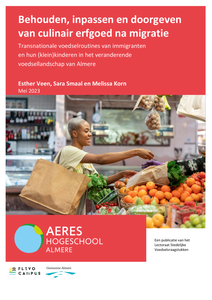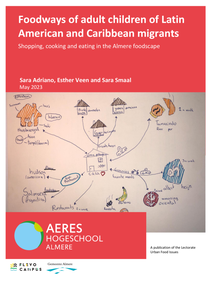This dissertation revolves around the older and younger Chinese immigrants in the Netherlands. Specifically, the topic of study was the wellbeing of the older Chinese immigrants, and cultural elements as filial piety may play part in the in the wellbeing of this population.Comparative studies regarding frailty, loneliness and Quality of Life were conducted in China and the Netherlands, among older Chinese adults. In general, the older Chinese immigrant adults are predominantly socially vulnerable, such as a high prevalence of loneliness, whereas the native Chinese adults report a high prevalence of frailty. A second cross-national study provided insights in the cross-cultural equivalence of the De Jong Gierveld loneliness scale among the native and diasporic older Chinese adults.The cultural element filial piety is found to be relevant both to the first- and second-generation Chinese immigrants in the Netherlands. It is specifically of importance to the mental wellbeing of the older first-generation Chinese immigrants. Moreover, a qualitative study shows that filial piety frames how filial caregiving takes place among the second-generation Chinese immigrants. Lastly, a normative filial piety scale was translated to Dutch and psychometric validated among second-generation Chinese immigrants.These findings indicate that older Chinese immigrants are socially vulnerable. Secondly, filial piety is of relevance to the Chinese immigrants in the Netherlands. It is of importance to consider these aspects for professionals working both with older and younger Chinese immigrants in the Netherlands.
DOCUMENT
In dit onderzoek onderzochten we hoe Almeerse inwoners met een niet-Nederlandse achtergrond (1e, 2de en 3de generatie) de voedselomgeving van Almere ervaren, en in hoeverre zij eten en koken uit de keuken(s) van hun voorouders. We hebben mensen met een migratieachtergrond geïnterviewd over hoe en waar zij boodschappen doen, wat zij koken en welke betekenis zij hechten aan eten en culturele gebruiken daaromtrent. Het is een vervolg op een eerder rapport van het lectoraat, ‘Wat schaft de pot in Almere?’ (Smaal en Veen 2023), waarin met een grootschalige enquête is verkend in hoeverre de bredere bevolking van Almere gebruik maakt van de multiculturele voedselomgeving.
DOCUMENT

In this article we look at the various paths taken by transnational and domestic entrepreneurs based on their education and work experience. These act as catalysts for skills that allow migrant entrepreneurs to better position themselves in different markets. Differences in migrant entrepreneurs allow us to better understand the strategies employed and the consequences for society and the economy at both domestic and transnational levels. Earlier research has extensively analysed individual characteristics of migrant entrepreneurs and, to a much lesser extent, the geographical nature of their business activities.This article addresses this gap by looking at the geographical orientation of migrant entrepreneurs’ businesses. The research question is as follows: In what ways are transnational or domestic activities of Moroccan migrant entrepreneurs in the Netherlands and Italy influenced by skills acquired in earlier experiences? We provide empirical evidence on the different paths leading to domestic and transnational activities using a micro-level perspective of the experiences collected in the narratives of first-generation Moroccan migrant entrepreneurs who have migrated to Milan or Amsterdam (N=70).Four different paths combining these two life experiences emerged from the interviews: #1 Job-based, #2 Education-driven, #3 Job-education merger, and #4 By chance (neither education nor work experience). The most relevant paths for migrant entrepreneurs seem to be the first (#1) and third (#3) paths. Furthermore, our findings show that transnationally oriented entrepreneurs have an extended business-oriented education and rely on skills learned, in contrast to domestically oriented entrepreneurs who become entrepreneurs ‘by chance’.
DOCUMENT

Rapport inzake sociale en multiculturele integratie in de Euregio Maas-Rijn (SMI-EMR) ten behoeve van de netwerkvorming van multiculturele organisaties in het kader van de immigratie en integratiepolitiek van de Europese Unie in het Nederlandse deel van de Euregio Maas-Rijn.
DOCUMENT

The research sets out to explore what adult children of migrants consider to be their eating culture and food identity. We do so by looking at how they shop, cook, and eat on a daily basis and what foods they feel connected to. A secondary goal of this research is to understand how important sustainable food is for this group. For this report, we invited adult children of migrants, who grew up in Almere to share their stories. Being born in the Netherlands with parents who were born abroad – in our case Latin-America and the Caribbean – children of migrants grow up in two different food environments simultaneously. Outside the home, they are surrounded by a Dutch food environment, while the eating patterns in and around their household or wider family setting may reflect the backgrounds of their parents.
DOCUMENT

Binnen het lectoraat Burgerschap en Diversiteit willen we onderzoeken op welke manier en onder welke voorwaarden burgers in deze tijd van globalisering en verstedelijking in staat zijn om actief deel te nemen aan het vreemdelingenverkeer van alledag. We doen dit vanuit een scherp besef dat het lectoraat van start is gegaan in een politiek en maatschappelijk gepolariseerd klimaat. Ik zal daarom in deze rede ook uiteenzetten welke visie op burgerschap en diversiteit ten grondslag ligt aan het onderzoek dat binnen het lectoraat wordt verricht.
DOCUMENT

Lectorale rede, Groningen, 14-05-2013Welke effecten heeft de demografische verandering op ruimte en op het dagelijks leven van bewoners.
MULTIFILE

Voor u ligt het rapport over de situatie in Nederland op het gebied van jeugd, zwerfjongeren en alleenstaande minderjarige vreemdelingen. Het rapport beschrijft risicofactoren voor kinderen en jongeren in relatie tot sociale uitsluiting en dak- en thuisloosheid. Dit rapport is het eerste onderdeel van het internationaal vergelijkend onderzoek ‘Combating Youth Homelessness’. MOVISIE voert dit driejarig onderzoek uit in opdracht van de Europese Unie. De samenwerkingspartners zijn drie universiteiten in: Engeland, Tsjechië en Portugal. De doelstellingen van ‘Combating Youth Homelessness’ luiden als volgt: 1. Het verkrijgen van inzicht in de levensloop van verschillende subgroepen zwerfjongeren in verschillende nationale contexten; 2. Het ontwikkelen van concepten op het gebied van risicofactoren en sociale uitsluiting in relatie tot de ervaring van zwerfjongeren zelf en de mogelijkheden voor re-integratie; 3. Het testen hoe verschillende methodieken bijdragen aan het re-integratieproces van jongeren in de samenleving; 4. Het onderzoeken van de relatie tussen jongeren, betrokken volwassenen, casemanagers, jongerenmentoren en familieleden ten opzichte van de opbrengst van de hulpverlening in de vier landen.
DOCUMENT

Geen samenvatting beschikbaar
DOCUMENT

Het Our Common Future (OCF) 2.0 project probeert de maatschappij een spiegel voor te houden en te wijzen op bedreigingen, maar ook op de grote kansen die er liggen om een duurzame maatschappij te ontwikkelen. In negentien deelonderwerpen zijn specialisten uit het hele land een maand of vier aan de slag geweest om dit duurzame toekomstbeeld te schetsen en een stappenplan te ontwikkelen om er ook daadwerkelijk te komen. Onderstaand stuk beschrijft één van deze deelonderwerpen. Het is geschreven door dertien specialisten op het gebied van toerisme. Het beschrijft de huidige ontwikkelingen in het toerisme, de bedreigingen, maar vooral de kansen die de Nederlandse toeristische sector heeft om in 2035 te komen tot 100% duurzaam toerisme vanuit en naar Nederland.
DOCUMENT
